Many medicinal mushrooms are adaptogens and contain beta-glucans and other compounds that work as biological response modifiers to help maintain a state of balance in the body.
Researchers believe their regulating action, which includes balancing the gut microbiome, nervous system and hormones like cortisol and melanin, is how these mushrooms help improve sleep.
The great thing about using medicinal mushroom extracts for better sleep is that you also access all the other health benefits they offer.
Read on to learn what causes poor sleep and insomnia, the best mushrooms for better sleep, how to use them and when to take them.
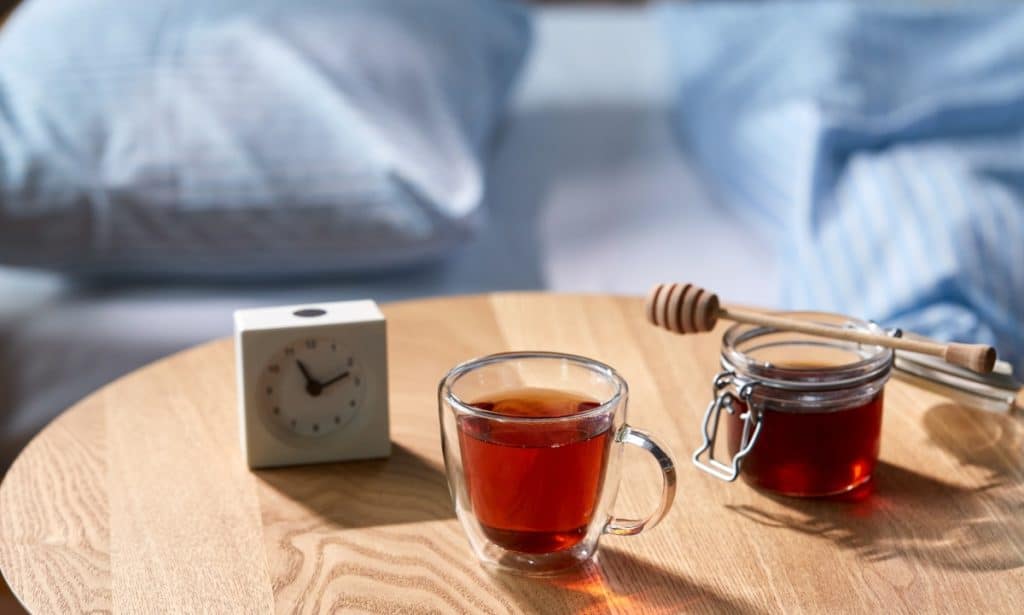
What Causes Poor Sleep and Insomnia?
Ever found yourself staring at the ceiling, wondering why you can’t get a good night’s sleep?
You’re not alone. More than 50 million Americans suffer from sleep disorders, and statistics from other countries are just as alarming.
Understanding the factors that may cause poor sleep and insomnia is the first step toward getting better sleep.
Small changes in your daily routine, reducing stress or paying attention to your sleep environment may be the key to a restful night’s sleep.
Below are some of the factors that could cause poor sleep and insomnia:
Stress and Anxiety
The demands of daily life can lead to heightened stress and anxiety that keeps us tossing and turning when it’s time to sleep. Understanding and managing stress and anxiety is a significant step toward better sleep.
Disrupted Circadian Rhythms
Our bodies operate on a finely tuned internal clock known as the circadian rhythm. Irregular sleep patterns, working odd hours or excessive late-night screen time can throw off this internal clock, making it harder to achieve a restful sleep cycle.
Sleep Environment
Where you sleep matters and can significantly impact the quality of your rest. Uncomfortable mattresses, excessive noise, or too much light can create less-than-ideal sleeping conditions. Making your sleeping environment relaxing and comfortable can make a big difference to sleep quality.
Medical Conditions
Ongoing health problems like chronic pain, respiratory issues or hormonal imbalances can impact your sleep. Seeking medical advice to address these conditions is crucial in managing insomnia effectively.
Daily Habits
What you do during the day can impact how you sleep at night. Too much caffeine, irregular exercise or eating heavy meals close to bedtime can disrupt your body’s natural sleep cycle. Changing a few bad habits can result in better sleep.
Blue Light Exposure
In our digitally connected world, screens emitting blue light are everywhere. The artificial glow from devices like laptops and cell phones can suppress the production of melatonin, a hormone essential for sleep. Limiting screen time before bedtime and utilizing blue light filters can help reduce this effect.
The 3 Best Mushrooms for Sleep
Here are some of the best medicinal mushrooms to use if you’re hoping to improve the quality of your sleep and reduce insomnia.
1. Reishi
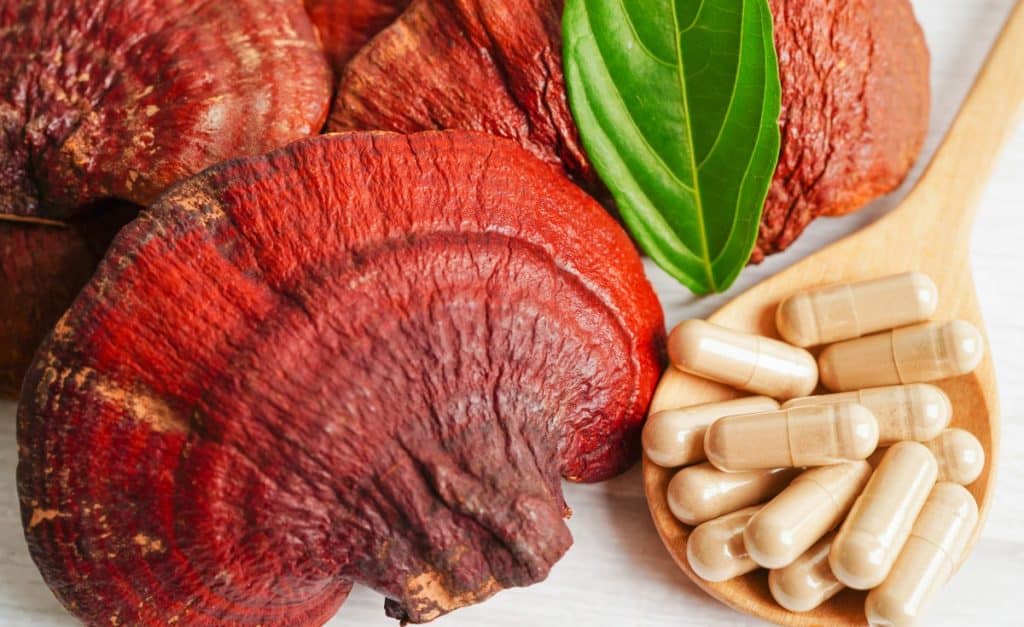
Reishi mushrooms are well-known medicinal mushrooms with loads of health benefits and a popular choice for enhancing sleep quality.
Traditional healers have used reishi for thousands of years to improve sleep, and now that modern science is catching up, it’s become a popular ingredient in bedtime beverages.
Although there are few clinical trials to confirm the effects of reishi mushroom on sleep in humans, animal and in vitro studies have produced promising results.
A recent study using mice indicates reishi extracts may improve sleep by reducing the time taken to fall asleep and increasing the quality and duration of sleep.
Results suggest that reishi extracts provide these benefits by modulating the gut microbiome and increasing sleep-promoting neurotransmitters in the hypothalamus.
Another study, using rats this time, suggests reishi increases total sleep time and promotes more non-rapid eye movement (NREM) sleep.
Taking reishi extract for 3 days significantly increased the rats’ total sleep and NREM sleep time without influencing slow-wave or REM sleep.
NREM sleep is crucial for the body’s recovery processes, which are necessary for daily productivity, focus, and performance.
But, although anecdotal evidence and animal studies show that reishi mushrooms help improve sleep and insomnia, scientists are still unclear on exactly how they work.
A 2021 study exploring the anti-insomnia mechanisms of reishi suggests they provide anti-insomnia effects via multiple mechanisms simultaneously that help regulate cell survival, cytokine production and immune function.
These findings are typical of adaptogenic mushrooms that work with several of the body’s organs and systems simultaneously to restore balance when exposed to external stressors.
2. Lion’s Mane
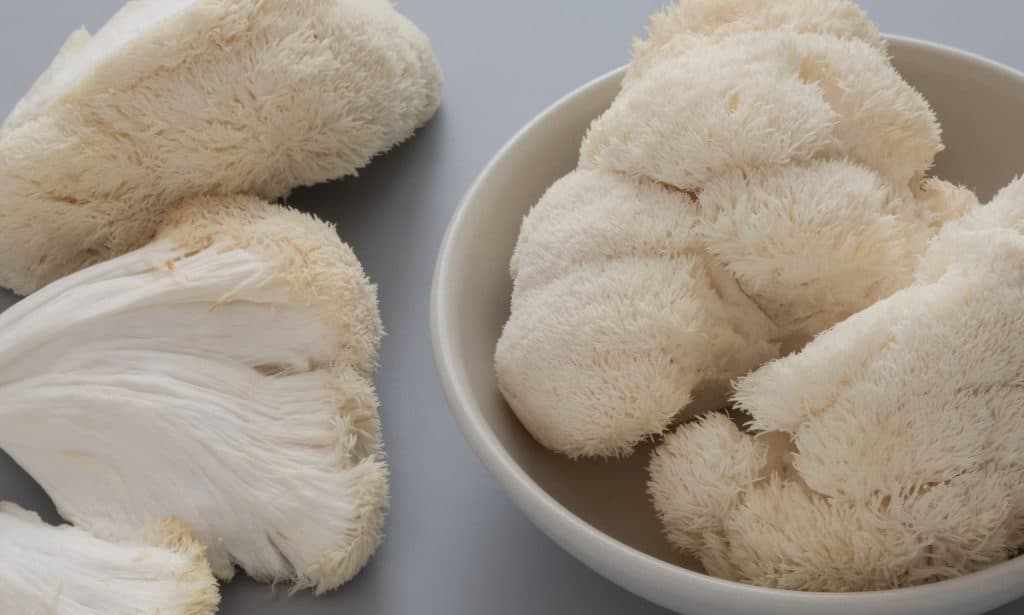
Lion’s mane is one of the most popular medicinal mushrooms and best known for its ability to boost immunity and help improve brain function, focus and productivity. Although it does offer several other health benefits.
But you may wonder, “Do lion’s mane mushrooms help you sleep?”
Studies suggest they could help improve sleep quality and reduce insomnia, but scientists need more clinical trials to fully understand how they provide these benefits.
A 2015 study involving eight university students experiencing stress and sleep disturbances showed that lion’s mane may effectively reduce anxiety and improve insomnia symptoms.
After taking lion’s mane for a month, participants noted decreased irritability, fatigue, and anxiety and enhanced sleep quality.
Another promising 8-week study used 77 volunteers to explore lion’s manes’ effect on mood and sleep disorders. The results of this study suggest it may help improve sleep quality by increasing pro-BDNF levels.
Researchers believe BDNF levels are linked to the extent and duration of sleep deprivation, with individuals suffering from insomnia showing lower BDNF levels.
By potentially increasing BDNF precursors, like pro-BDNF, lion’s mane could assist the body in producing more of it and reduce deficiencies associated with sleep disorders.
Additionally, animal studies suggest lion’s mane extracts might help address circadian rhythm issues linked to delayed sleep phase disorder. A condition where sleep patterns are delayed by two or more hours from the norm.
If you live in the UK and are looking for a high-quality lion’s mane supplement, check out our list of 10 of the best lion’s mane supplements in the UK.
3. Cordyceps
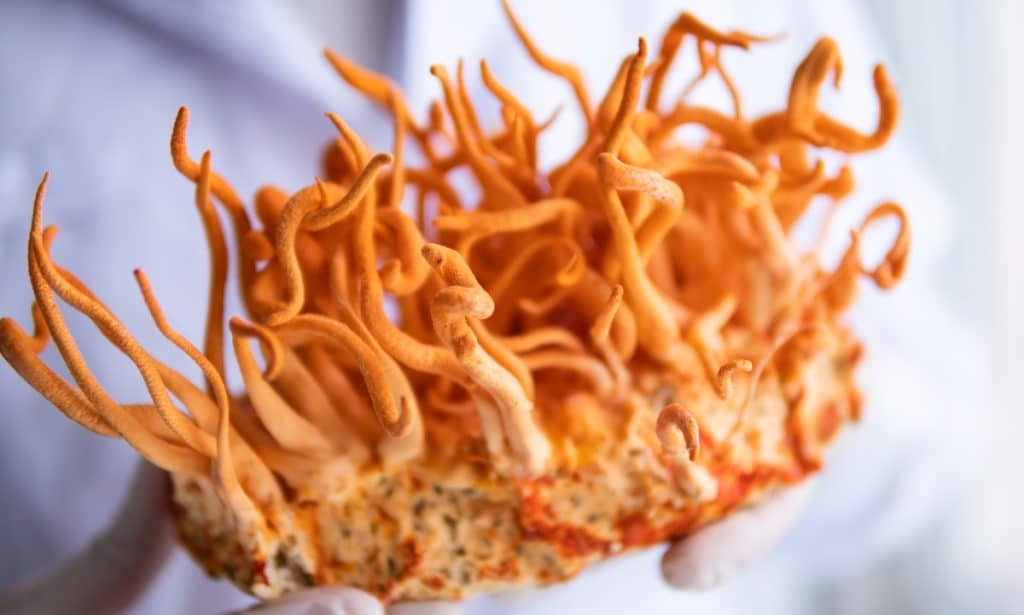
Cordyceps mushrooms offer several health benefits but are best known for their ability to improve physical performance and endurance and reduce fatigue.
It may seem strange that a mushroom known to provide energy would be beneficial for sleep disorders.
But as the compounds in cordyceps provide these benefits by promoting a steady release of energy, increasing oxygen uptake, reducing inflammation and increasing blood flow to brain cells, they also contribute to brain health.
Cordyceps also boosts brain health by preventing cell damage from oxidative stress and protecting the hippocampus, resulting in lower anxiety levels and better sleep.
But this is not the only way cordyceps may help you get better sleep.
Research suggests cordyceps can effectively reset biorhythms, helping us adapt to time zone differences and reducing the impact of jet lag.
Like lion’s mane, cordyceps can cross the blood-brain barrier, allowing it to swiftly adjust the circadian rhythm phase after a long journey across time zones.
Other research using rats indicates that cordycepin, one of the bioactive compounds in cordyceps, could play a role in sleep regulation and has future potential as a treatment for sleep disorders.
In this study, cordycepin reduced sleep-wake cycles, increased NREM sleep, and decreased REM sleep. It also increased total sleep time and reduced wakefulness.
What Does Healthy Sleep Look Like?
Although sleep quality changes during the different phases of our lives, and the amount of sleep required varies from person to person, a good night’s sleep looks similar for everyone.
Characteristics of healthy sleep include:
- Falling asleep easily within 10-15 minutes of closing your eyes
- Sleeping through the night with minimal disturbances (no more than 2)
- Going back to sleep quickly if you do wake up
- Not waking up too early
- Feeling refreshed and energized in the morning
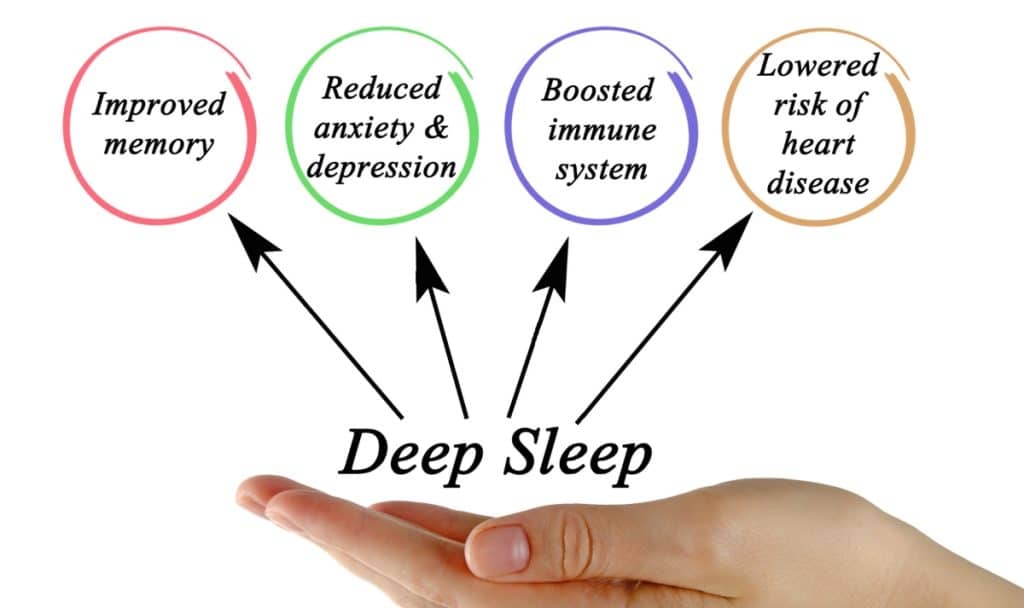
The Consequences of Poor Sleep
Sleep is essential for optimal health and plays a vital role in brain function, metabolism, appetite regulation and the body’s immune, hormonal and cardiovascular systems.
In the past, no one took lack of sleep too seriously, but daytime drowsiness and a lack of focus and concentration are not the only consequences of poor sleep.
During sleep, crucial biological processes occur in the body and brain, including storing new information, getting rid of toxic waste, repairing cells and releasing hormones and proteins.
Recent research has revealed that sleep disruption and ongoing poor sleep can have serious health consequences, including an increased risk of diabetes, obesity, anxiety, depression, hypertension, heart attacks and strokes.
How Mushrooms Help With Sleep
Many medicinal mushrooms are adaptogenic functional foods that work on several of the body’s systems simultaneously to help it maintain or return to balance when exposed to internal and external stressors.
One of the ways they achieve this is by promoting a healthy sleep-wake cycle and restful sleep, as the body needs sleep to function correctly.
Medicinal mushroom extracts work in several ways to promote better sleep, including:
- Helping the body adapt to stress
- Promoting relaxation and the onset of sleep
- Increasing sleep duration
- Enhancing the quality of NREM sleep
- Supporting healthy circadian cycles
- Regulating neurotransmitters
- Supporting the immune system
- Reducing cell damage from oxidative stress
- Providing anti-inflammatory effects
Do Regular Mushrooms Help You Sleep?
Although regular edible mushrooms are healthy nutrient-dense foods, consuming them is not the best way to improve sleep.
Medicinal mushrooms are a better choice, and even then, you first need to extract their beneficial compounds to access maximum sleep benefits.
The best way to enjoy the sleep-enhancing benefits of medicinal mushrooms is to take a regular daily dose of medicinal mushroom extract.
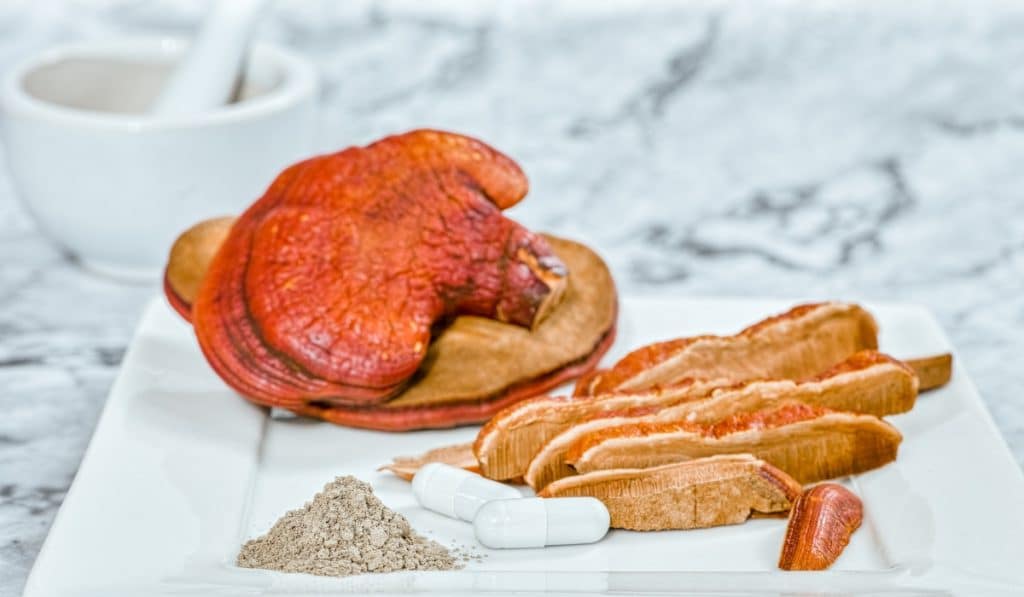
How to Use Mushrooms for Sleep
Medicinal mushroom supplements are the easiest way to add mushrooms to your daily routine, and due to their skyrocketing popularity, there’s a wide range of supplements on offer, including:
Mushroom Extract Powder
Mushroom extract powder is exceptionally versatile and a great addition to your morning oatmeal, protein shake or smoothie, but you can sprinkle it over almost any meal.
You’ll also find mushroom powder blends that combine several medicinal mushrooms and in ready-to-use coffee and tea blends.
Liquid Extracts
Mushroom tinctures, or liquid extracts, usually come in small bottles with a dropper, providing a fast, convenient way to get your daily dose of medicinal mushrooms.
Placing a few drops under your tongue is the fastest way to get your mushroom benefits, as there are lots of blood vessels underneath your tongue, ensuring the extract enters your bloodstream quickly.
But, if the taste is too bitter, you can add your liquid extract to beverages, smoothies or meals.
Capsules
Medicinal mushroom capsules containing mushroom extract powder provide a quick, no-mess, no-fuss option for people on the go.
You can’t beat them when it comes to convenience, and they also provide a reliably measured dose, so you know how many beneficial compounds you’re getting.
Gummies
Mushroom gummies may be the best supplement for you if you don’t enjoy swallowing capsules.
They come in several flavors, and you can chew them like a soft sweet, making them the most fun of all the mushroom supplements.
Many gummies contain more than one mushroom extract to create a mushroom blend that provides specific benefits.
If you’re having trouble deciding which supplement to try, our article comparing mushroom tinctures vs. extracts vs. powders vs. capsules may help you.
When to Take Mushrooms for Sleep
The benefits of medicinal mushrooms compound over time, and although the occasional dose of reishi at bedtime may promote relaxation and improve sleep short-term, regular use provides the best results.
Since many of the benefits of functional mushrooms are not immediate, frequency and consistency matter more than the time of day that you take them.
We recommend taking mushroom extracts in the morning, at least 10 minutes before eating, especially cordyceps, that may boost energy levels, or lion’s mane, that helps focus and concentration.
This will allow you to enjoy their other health benefits during the day while still getting a better night’s sleep.
The best dose for you and how quickly you’ll notice better sleep varies depending on your health and how unbalanced your body’s systems are.
Final Thoughts
Most mushrooms contain active compounds, minerals and vitamins that provide antioxidant and anti-inflammatory effects, which help overall health and wellbeing.
But, some mushrooms are also adaptogens that modify our biological responses to help maintain balance in the body, and improving sleep is one of the ways these mushrooms achieve this.
Mushroom extracts made using the dual extraction method are the most potent supplements for better sleep, as they provide access to as many of the mushroom’s beneficial compounds as possible.
To learn more about medicinal mushrooms and their benefits, visit our Mushroom Education Hub.
And if you live in the UK, we suggest trying our range of high-strength, organic medicinal mushroom extracts.
